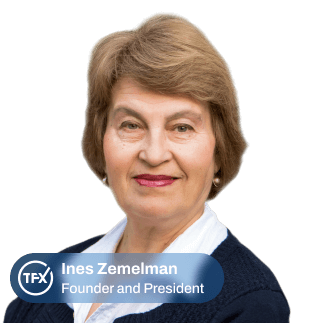Form 3520: Guide on reporting foreign trusts, inheritances, and gifts for US expats

Living abroad does not exempt US citizens from IRS reporting obligations involving foreign trusts and large foreign gifts. Form 3520 outlines what expats need to disclose and by what due date to avoid harsh penalties.
This guide is designed to help US taxpayers understand what’s required and stay fully compliant.
What is IRS Form 3520
Form 3520 is the Annual Return to Report Transactions with Foreign Trusts and Receipt of Certain Foreign Gifts–a document required by the IRS when US persons are involved with foreign trusts or receive substantial gifts or inheritances from abroad.
In simple terms, it’s how you tell the IRS you got a big gift from a foreign person, put money into a non-US trust, or benefit from one in any way. While the form doesn’t always result in tax owed, failing to report can lead to steep penalties.
NOTE! As of December 2023, this IRS Form has transitioned to a continuous-use format, that means the layout and lines don’t change annually. Always check IRS.gov/Form3520 for current instructions.
Also read. Non-US trusts remain IRS target
Why the IRS requires it
The IRS uses Form 3520 to prevent abuse of foreign accounts and to keep tabs on large, offshore financial activities by US taxpayers. Here are the three main scenarios where you’re required to file:
1. Foreign gifts and inheritances
If you receive more than $100,000 in total from a foreign individual or estate during the year, or more than $19,570 from a foreign company or partnership, you must report it. This isn’t about paying tax–it’s about disclosure.
For instance, if your grandfather in Germany leaves you €120,000 in his will. Even though it’s not taxable, you must file Form 3520 to report it.
2. Transfers to foreign trusts
-
You’ve created or added money or assets to an overseas trust.
- This includes cash transfers, real estate, or securities.
- Even if it’s your own trust, and even if nothing is distributed back to you, the IRS wants to know.
3. Ownership or distributions from foreign trusts
If you’re considered the owner of a trust under IRS rules, or you receive distributions, interest-free loans, or benefits like rent-free use of trust property, you’re required to report it.
Example: You get $40,000 from a trust in the Cayman Islands or spend three months living in a trust-owned home in Tuscany rent-free–both situations trigger a filing obligation.
Form 3520 vs Form 3520A: key differences
| Feature | Form 3520 | Form 3520A |
|---|---|---|
| Who files it | US individuals who receive large offshore gifts or interact with offshore trusts. | Foreign trust (or the US owner if the trustee doesn’t file). |
| Due date | April 15 (June 15 for expats) –extendable to October 15 via Form 4868. (NOTE! cannot be extended past October) | 15 day of the third month (following month of trust year-end) – extendable to September 15 via Form 7004. |
| Penalties | Starts at $10,000 – up to 35% of unreported transfers or 25% of unreported gifts. | $10,000 or 5% of trust assets attributable to US owner. |
| When it’s required | When you receive $100K+ in foreign gifts or deal with foreign trusts. | Always required if a trust has a US owner under IRC 671 - 679. |
It is noteworthy that the IRS may waive penalties if you can prove that your failure to file was due to reasonable cause and not willful neglect. Documentation and good faith efforts are key.
Who must file Form 3520
Form 3520 is required for US taxpayers with ties to trusts or large offshore gifts, so if any of the following situations apply to you, filing this tax form is mandatory.
1. You own a foreign trust under US tax rules.
If you're considered the owner of an offshore trust under grantor trust rules (IRC 671679), you’re required to file Form 3520. Even partial control or influence over the trust may qualify as ownership.
2. You transfer assets to a foreign trust.
Whether it’s cash, real estate, or other property if you’ve moved assets into a foreign trust, that’s a reportable event. Tax form 3520 captures the details of these transactions to ensure transparency.
3. You receive a distribution from a foreign trust.
Distributions aren’t limited to money rent-free use of property or an interest-free loan from the trust also count. You must report the fair market value of what you received on Form 3520.
4. You’re the responsible party for a trust event.
Creating a non-US trust, transferring ownership, or significant restructuring may all trigger reporting. If you're the person required to report these changes, 3520 is where it gets documented.
Key components of Form 3520 (part by part)
Form 3520 is structured to capture the full spectrum of financial interactions between US persons and foreign trusts or entities. Whether you're transferring assets, receiving distributions, or inheriting large gifts, each part targets a specific scenario requiring IRS disclosure.
Part I – transfers to foreign trusts
US persons who fund or transfer assets to a foreign trust must complete this section and report the nature of the transfer, trustee details, and beneficiary info. Even loans or obligations involving foreign trusts are considered reportable transactions.
Part II – US ownership of foreign trusts
If you're considered the owner of an overseas trust under grantor trust rules, you must disclose ownership details, including how and when control was established. This part is about transparency even if you haven’t received any distributions yet.
Part III – foreign trust distributions
This applies to anyone who received distributions cash, property, or indirect benefits from trusts based abroad during the year. You’ll need to list each benefit received, even if it’s non-cash like rent-free property or an interest-free loan.
Part IV – large foreign gifts received
US persons must report gifts exceeding $100,000 from foreign individuals or estates or over $19,570 from foreign corporations or partnerships in 2025. While not taxed, failing to report can trigger steep penalties and raise audit risks.
Form 3520 preview
When and where to file Form 3520
- Due the same day as your Form 1040 - April 15 (or June 16 in 2025 for expats), with a possible extension to October 15 which you can access through our free tax extension service.
NOTE! Very important: Unlike your individual return Form 1040, Form 3520 cannot be extended past October 15.
- Must be mailed physically to the IRS - Internal Revenue Service, P.O. Box 409101, Ogden, UT 84409.
- Form 3520 cannot be filed electronically - paper filing only.
- Late filing penalties start at $10,000 - and can increase significantly based on the amount and duration of non-reporting.

Consequences of non-compliance
Failing to file Form 3520 or filing it late or inaccurately can flag your tax return for closer IRS scrutiny, increasing your risk of an audit. In serious cases, especially where foreign trust ownership or distributions are involved, the IRS may assess cumulative penalties across multiple years or issue summons for additional financial records.
Beyond monetary penalties, non-compliance can delay the processing of your entire tax return, trigger foreign asset investigations, and complicate future disclosures under programs like the Streamlined Filing Compliance Procedures. Even if the transactions are non-taxable, incomplete reporting signals risk and could jeopardize your standing with the IRS.
Failure to file Form 3520... will suspend the period of limitations for assessment of tax with respect to the related transaction... for at least 3 years. – IRS Form 3520 instructions
Get expert assistance with your Form 3520 filing
Navigating Form 3520 instructions can be overwhelming, especially for US expats dealing with foreign trusts, receiving large gifts from foreign individuals, or inheriting from abroad.
This IRS form is required any time a US person is involved in these types of cross-border financial events. With strict reporting rules and potential penalties, understanding how to properly disclose these transactions is critical for staying compliant.
Let Taxes for Expats take the stress off your shoulders. Our seasoned tax professionals specialize in US tax compliance and are ready to guide you through Form 3520 from understanding the instructions to reporting trust interactions and foreign inheritance accurately.


Stay IRS-compliant with your business abroad – we’re ready to help


